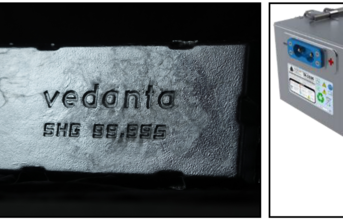
Zinc-based batteries are better alternatives to lithium-ion based batteries owing to a far more stable chemistry. Zinc-based batteries are stable and hence safer unlike lithium-based batteries that are less stable and hence less safe, posing serious risks of combustion. Lithium is a rarer element in nature and is imported into India, causing a drain in forex. Zinc is abundantly available in India through vast domestic reserves. Above all, lithium is far costlier (more than four times) compared to zinc which is much more affordable. Zinc-based batteries offer long duration storage for enhanced battery lifespan, superior energy performance for extended usage, lower cost of ownership and ease of operations for all weather conditions. This makes zinc batteries far more versatile.
Speaking on the company's efforts to support the ongoing global energy transition, Arun Misra, CEO Hindustan Zinc, said "Our climate action initiatives are focused on aiding the global energy transition through sustainable sources of energy. Batteries have the potential to accelerate this transition through energy storage. While Lithium batteries are currently in focus, lack of domestic availability of lithium and safety of lithium batteries are key challenges for the global energy transition. Zinc presents a safe, stable and credible opportunity to replace lithium-ion batteries. We have taken the first step with our proposed partnership with US based Aesir Tech, specialising in next-gen zinc battery tech. In addition, we are also exploring research avenues in battery technology with premier academic institutions in India. Hindustan Zinc with its vast domestic zinc reserves, is well poised to accelerate India's mission to a cleaner tomorrow and our Zinc battery initiative will also help in saving exchequer's funds due to zinc's abundance in the country."
According to a recent Bloomberg NEF report, the global energy storage market is on an upward trajectory, with projections of an annual growth of 21 per cent, reaching 442 GWh by 2030.
He further added, "Zinc's usage in batteries has been in wide circulation since the early 1800s. Zinc-carbon batteries or dry-cells are already in common day-to-day use and other chemistries are rapidly developing. Some of the emerging zinc-based battery chemistries include zinc-manganese, zinc-ion, nickel-zinc and zinc-air."
Zinc batteries are flexible, capable of long cycle life, high specific energy, and power. They have a wide operating temperature and require minimal upkeep to maintain performance and safety. They are built with non-flammable materials, are non-reactive to air and water, and produce no toxic fumes, ensuring greater safety. Additionally, Zinc-based batteries are recyclable, use non-hazardous raw materials, and have a greenhouse gas (GHG) footprint six times lower than other technologies.



























